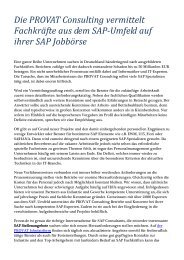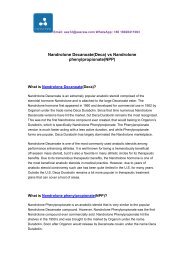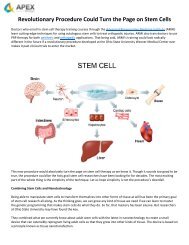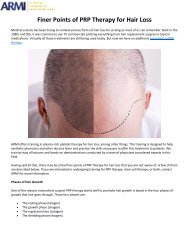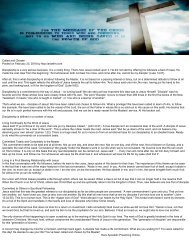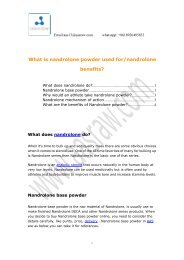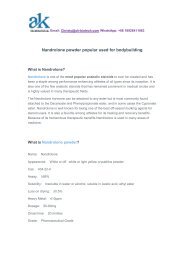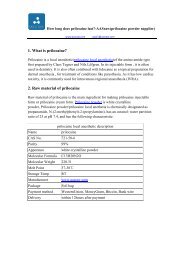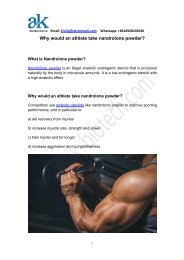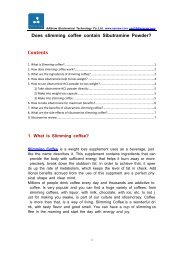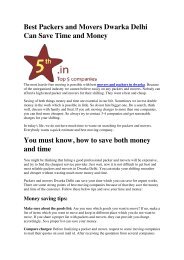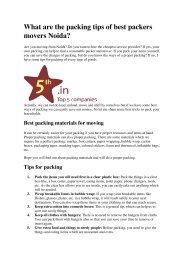The 3 Week Diet - Introduction Manual
Many of us are paralyzed by the con"icting information being given out in the health and nutrition #eld. !ere are hundreds (if not thousands) of diets and nutritional plans, quick fix pills and powders, gadgets and gizmos, infomercials and gurus who are all giving us confusing and very often, con"icting information on how to lose weight.
Many of us are paralyzed by the con"icting information being given out in the health and nutrition #eld. !ere are hundreds (if not thousands) of diets and nutritional plans, quick fix pills and powders, gadgets and gizmos, infomercials and gurus who are all giving us confusing and very often, con"icting information on how to lose weight.
Create successful ePaper yourself
Turn your PDF publications into a flip-book with our unique Google optimized e-Paper software.
THE 3-WEEK DIET—INTRODUCTION MANUAL<br />
In general, animal proteins (meat, fish, poultry, cheese, eggs) are considered “complete proteins.”<br />
<strong>The</strong> “incomplete proteins” are those that are vegetable based, usually in the form of grains, legumes,<br />
nuts and seeds. To get enough essential amino acids through vegetable protein, one usually<br />
has to combine several different food groups together in a strategic combination.<br />
Breaking down and processing protein takes a lot more energy and much more time than it does<br />
to break down other nutrients. In other words, the body has to work a lot harder to digest protein<br />
than it does with carbohydrates and fat.<br />
<strong>The</strong> extra energy it takes to break down and process protein reduces the amount of energy your<br />
body receives from that food it consumed. Also, because it takes longer to break down and to assimilate<br />
protein, the process of emptying the stomach takes longer as well, which causes us to feel<br />
full longer, which reduces hunger pangs.<br />
It is believed that the body can only use about 50% of the protein we eat. This means the other<br />
50% is eliminated from the body as waste because protein is not stored in the body the same way<br />
that fat and carbohydrates are. So, when you eat calories primarily from protein, you can rest<br />
assured that these protein calories are repairing and rebuilding your body with the excess being<br />
eliminated as waste. <strong>The</strong> extra protein will not be stored as body fat. As you will see, this is in stark<br />
contrast to excess carbohydrates and fat we eat, which are stored on our bodies in our fat cells instead<br />
of being eliminated.<br />
Adding protein to your meals causes your body to release a hormone called glucagon. Glucagon<br />
works to slow down the harmful effect of excess carbohydrates from being deposited into our fat<br />
cells. It does so by slowing the rate of absorption of those carbohydrates. Additionally, there are<br />
new studies that have shown that when the body releases glucagon (by consuming protein in your<br />
diet), it also works to stimulate fat-burning by freeing up your stored body fat, so that it can be<br />
used to fuel your body.<br />
As you will see, when we increase protein consumption and significantly decrease the amount of<br />
carbohydrates we consume, we benefit from a dual fat-burning effect. On one hand, when the<br />
body does not have carbohydrates to turn to, to fuel the body, it begins to use stored body fat.<br />
Secondly, the release of glucagon into the body appears to have the added effect of attacking the<br />
fat stores that the insulin has worked to preserve. <strong>The</strong> 3-<strong>Week</strong> <strong>Diet</strong> is strategically designed to take<br />
advantage of both these events.<br />
16



